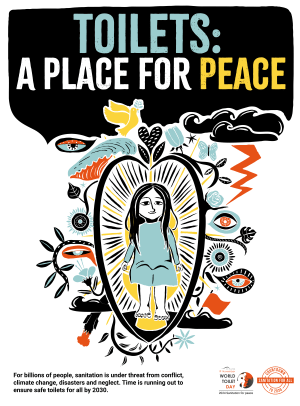World Toilet Day 2024: effective sanitation, essential to sustainable development

Three and a half billion people still live without safely managed sanitation services, 419 million of whom practise open defecation. ‘ Safe toilets for all by 2030 ‘ is one of the targets of Sustainable Development Goal 6, but the world is still a long way from achieving this target.
Initiated by the United Nations in 2013, World Toilet Day takes place every year on 19 November. This year's theme, ‘ Toilets are a place for peace’, is a reminder that conflicts, extreme weather events and disasters can destroy, damage or disrupt sanitation services. And when toilet systems don't work, or don't exist, untreated faeces spill out into the environment and deadly diseases such as cholera appear.
A safe toilet is one that treats human waste on site, or stores it safely before removal for off-site treatment, or is connected to a functioning sewerage system and treatment plant.
With a major role in protecting the environment, access to sanitation (and drinking water) is a catalyst for sustainable development and essential resilience against the effects of climate change.
Sanitation solutions tailored to the local context
Collective or individual, in rural or urban areas, OiEau has been implementing the solutions best suited to the local context for over 30 years, whether in terms of knowledge and training or in terms of the organisation of regulatory or management institutions.
On a technical level
With a number of experts in the field and facilities that are unique in Europe, OiEau is able to meet the operational, technological and strategic needs of wastewater treatment professionals.
At its La Souterraine site, the OiEau Training Centre has full-scale platforms dedicated to wastewater treatment, which recreate the working environment as closely as possible:
- a ‘Sanitation’ teaching network, with a wide range of materials and equipment, including some of the most commonly used in the world;
- a network that can be visited, enabling professionals to be trained and qualified to work in networks and confined spaces in complete safety;
- educational facilities representative of urban wastewater treatment;
- an area dedicated to non-collective wastewater treatment, with a range of approved systems on display, above ground and without water supply.

Focus
New training course for developing countries
OiEau has included in its Training Centre catalogue a course dedicated to sanitation and hygiene in developing countries (WASH), which provides an introduction to the technologies and specific features of water and sanitation in developing countries, and identifies the key points of a water and sanitation development project.
Objective, impartial support
For more than 30 years, in France and abroad, OiEau has been committed to providing effective and sustainable support to players in the water, sanitation, waste and environment sectors.
In more than 80 countries, OiEau carries out actions to facilitate the exchange of experience and knowledge between water stakeholders through information-sharing platforms, conferences and specialised publications. Activities range from the very local to large-scale projects such as support for the implementation of the Urban Wastewater Directive for the 27 European countries.
OiEau also offers project management assistance, with broad-based strategic support to guide the various sector players towards improving their missions, organisation and methods.
OiEau can provide assistance within the framework of institutional and/or organisational reforms in the water sector, and in particular on :
- integrated water resources management, implementation of basin management, application of European directives,
- water data management, with support for setting up water information systems at all levels, from local to international,
- improving the performance of public services and building skills.



